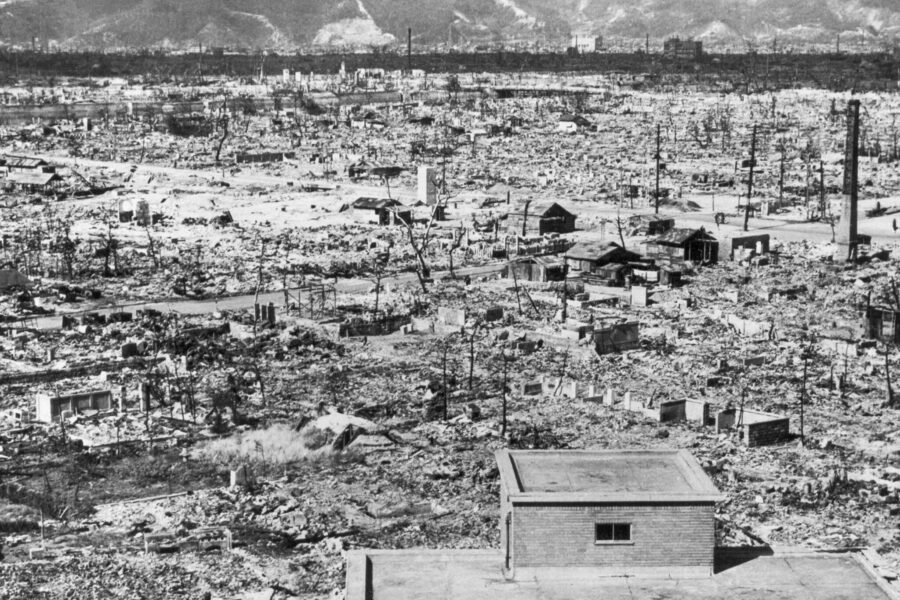What Hiroshima Survivors Teach Us About Trauma and Resilience
With fresh horrors reported daily out of Israel and Gaza, trauma is inescapable. In a remarkable interview at NPR, 97-year-old psychiatrist Robert Jay Lifton shares what he’s learned about trauma and hope in his new book: Surviving Our Catastrophes: Resilience and Renewal from Hiroshima to the Covid-19 Pandemic.
Over the course of his long career on the faculty of several universities, including Harvard, he’s studied the intersection between psychology and world events. He’s spent decades interviewing survivors of Auschwitz, Vietnam veterans, survivors of Hiroshima and Nagasaki, and victims of Chinese government repression. What he’s discovered about trauma and resilience is that telling their stories – and even working to try to change policy – can help people recover.
Direct excerpts from the NPR interview follow:
You’re well beyond the retirement age for most people and you still have the passion to keep going. Why did you write this book?
I wrote this book out of a conviction that my understanding of survivor power could contribute to surviving catastrophe in general. I tried to present a combination of the survivors’ struggles and an avenue of hope because survivors can be at the center of resilience and renewal. I think what’s key here is the transformation from the helpless victim to the agent of survival. In Hiroshima, for instance, I interviewed people who had undergone the most extreme kind of trauma and victimization. And yet they were partly by means of that experience able to transform themselves into life-affirming groups so that the very same people who had so suffered from trauma could make use of that trauma as a source of knowledge and power.
What did you find among the survivors of Hiroshima and Nagasaki that might bring hope to survivors of catastrophe?
There are so many Hiroshima and Nagasaki survivors who on the one hand suffered as victims and on the other hand found ways to form a collective narrative and in turn have contributed to political stands against the bomb.
I interviewed people who had undergone the most extreme kind of trauma and victimization. And yet some of the very same people who had so suffered from trauma have shown what I call “survivor wisdom” — they transformed themselves from helpless victims to agents of survival.
You heard powerful and disturbing stories from the survivors – the man who told you nearly 20 years after the bombing that he could still smell the stench from the corpses and cremations, those who remembered the “deathly silence” or the low moans from people around them or seeing corpses everywhere they looked. Is it therapeutic for these survivors to talk about their experiences?
We human beings are meaning-hungry creatures. For survivors that’s doubly so. When people undergo very great trauma, they either close down or open out. I called the closing-down “psychic numbing,” by which I mean a diminished capacity or inclination to feel. There are times when people need to be silent because it isn’t possible for them to speak. But as they emerge from that silence, as they sometimes could in their dialog with me, they could increasingly confront what they had been through. And a certain amount of emergence from that silence, from the numbing, is necessary for survivors to begin to play the role of agents of [their own and society’s] renewal.
There are survivors who have emerged as the basis and baseline for social change and for anti-nuclear achievements – take the recent U.N. decision that all stockpiling of nuclear weapons is against international law. That decision was very much enhanced by the efforts of Hiroshima survivors. And for some hibakusha, repeatedly expressing the details of their experiences has been crucial to their own healing. They are giving their extreme trauma, their victimization, a sense of meaning and purpose. And that has a definite healing impact.
And if they don’t go so far as to get involved in a movement, if they just share their story with a therapist or a friend or a family member – can storytelling still be helpful?
It can still be very helpful to them – sharing their stories so that others hear and their suffering is recognized as is their achievement in having survived it.
There are phases, sometimes even lifelong phases of Auschwitz survivors, many of whom I interviewed, during which they are unable to talk about what they went through. Because the pain is too overwhelming and it’s a reminder of being back in Auschwitz. It becomes important for most of them to find a way to articulate what they saw and experienced. Otherwise, they can be stuck in their trauma, and stuckness means lacking the capacity to confront or articulate what they had been through. There is a parallel to them and Hiroshima survivors — there is doubt when there is such murderous behavior from one human group to another and doubt about the continuity of human life in general. And that’s another reason why it becomes important to make contact with survivors of Auschwitz, to help them regain that confidence in the continuity of human life in general. Once they are able to confront what they had been through, if they are able to do that, it can be very therapeutic for them.
You can read the full interview here.
Silberner, Joanne. “What survivors of trauma have taught this eminent psychiatrist about hope.” NPR.org, 8 Oct 2023, https://www.npr.org/sections/goatsandsoda/2023/10/08/1203975027/what-survivors-of-trauma-have-taught-this-eminent-psychiatrist-about-hope.
Photo credit: Wikimedia Commons



